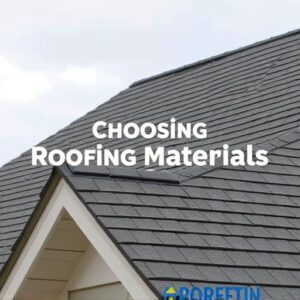When choosing roofing materials, consider cost, climate, and aesthetics. Asphalt shingles are budget-friendly and durable; metal stands out for strength and longevity; wood shakes offer classic looks but are expensive; clay tiles provide superior quality and protection; slate is premium yet durable; TPO/EPDM and metal offer cost-effective solutions; local recommendations vary based on trends and climate; labor costs impact pricing, with complex designs increasing expenses; regional pricing differs due to material availability and environmental conditions; home size affects costs per square foot; long-term benefits and maintenance needs should be considered beyond initial expenses.
“Curious about average roofing costs per square foot? Understanding your options is crucial when choosing roofing materials for your home. This comprehensive guide breaks down the key factors influencing roof replacement expenses, from asphalt shingles’ affordability to clay tiles’ premium pricing. We explore various materials, including metal, wood shake, and more, along with insights on labor costs, regional variations, and how home size impacts pricing. By considering these factors, you can make an informed decision when navigating the roofing landscape.”
- Understanding Roofing Cost Factors
- Asphalt Shingles: Budget-Friendly Option
- Metal Roofing: Higher Upfront Cost
- Wood Shake: Traditional Yet Expensive
- Clay Tiles: Premium and Durable
- Comparisons Between Common Materials
- Labor Costs: Significant Variable
- Regional Differences in Pricing
- Home Size Impact on Roofing Costs
- Maintenance and Longevity Considerations
Understanding Roofing Cost Factors
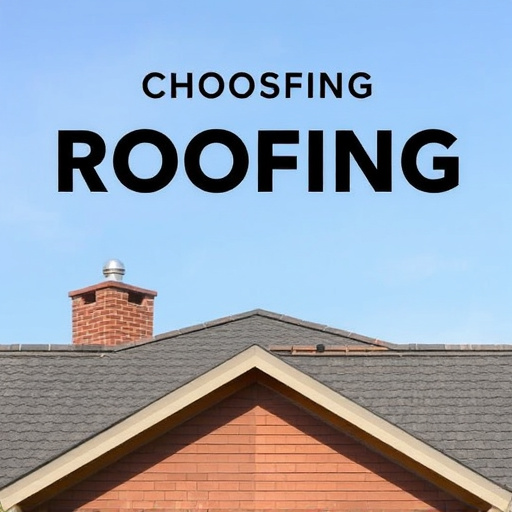
When estimating the cost of a roof, several factors come into play, and understanding them is crucial to budgeting accurately. The primary influences include the size and shape of your roof, the local climate conditions, and—most significantly—the choice of roofing materials. Each material has its unique price range, performance characteristics, and longevity. For instance, traditional asphalt shingles are commonly chosen for their affordability and ease of installation, while metal roofs offer durability and modern aesthetics at a higher cost.
Additionally, specific considerations like fire resistance (a priority in many regions) or energy efficiency (with the rise of cool roofing materials) can impact costs. Local roofing material recommendations often take into account these factors, suggesting suitable options that balance performance, durability, and budget for your area’s unique needs. Whether you prefer the sleek look of modern metal roofing designs or prioritize fire-resistant roofing systems, understanding these variables will help when choosing roofing materials.
Asphalt Shingles: Budget-Friendly Option
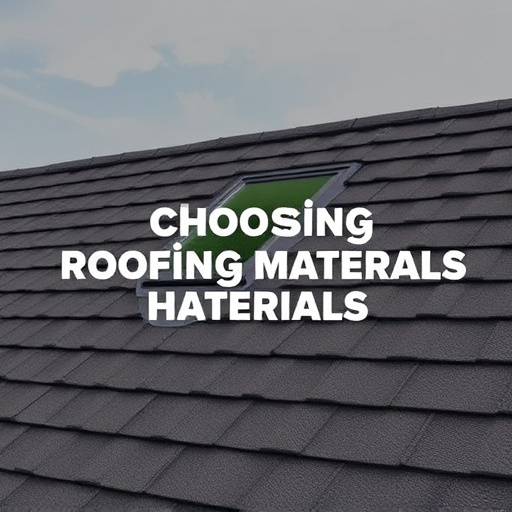
When considering choosing roofing materials for your home, asphalt shingles stand out as a budget-friendly option. They are one of the most common and affordable roofing choices available, making them an excellent starting point for any homeowner looking to maintain a reasonable budget. Traditional asphalt shingles come in various styles, offering both visual appeal and durability at a relatively low cost.
This budget-friendly choice is particularly well-suited for homes in areas with moderate climates, as they can withstand typical weather conditions without breaking the bank. While not the longest-lasting roofing material compared to some hybrid roofing systems or premium options based on climate, asphalt shingles deliver excellent value for money and are easy to install and maintain, making them a popular choice for those looking for both style and affordability in their roofing solutions.
Metal Roofing: Higher Upfront Cost
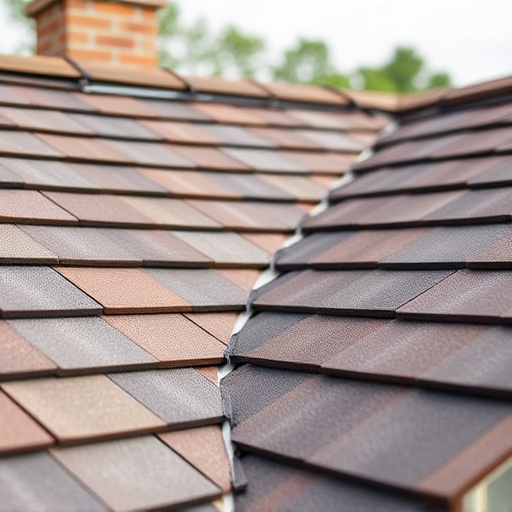
When considering different roofing materials, one option that stands out due to its durability and aesthetics is metal roofing. While it offers an array of benefits, including superior strength against harsh weather conditions and low maintenance requirements, it typically comes at a higher upfront cost compared to traditional shingles or other materials. This initial investment can be a significant factor for homeowners looking to balance quality with affordability.
However, the longevity and performance of metal roofing make it a smart choice for those aiming for long-lasting roof material solutions. Additionally, its versatility allows for integration with solar panel roofing systems, providing an opportunity to enhance energy efficiency. As such, when choosing roofing materials based on climate and durability, metal offers a compelling case for homeowners seeking both style and substance in their roofing options, especially considering hybrid roofing systems for homes that combine the best of multiple materials.
Wood Shake: Traditional Yet Expensive
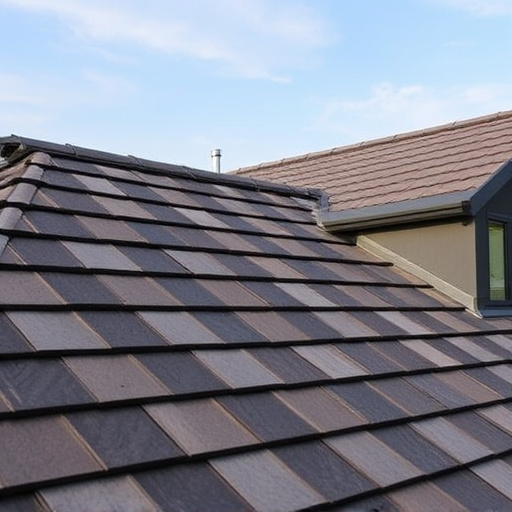
Wood shake roofs have been a traditional choice for many homes due to their distinctive look and natural appeal. However, this timeless option comes at a premium price in terms of cost per square foot compared to other roofing materials. The expense stems from several factors, including the labor-intensive installation process and the high-quality, durable nature of wood shakes designed to withstand harsh weather conditions. For homeowners looking for a classic, traditional roof that complements historical or rustic house styles, wood shake may be the preferred choice despite its higher cost.
When considering roofing materials, it’s essential to weigh the aesthetic appeal against budget constraints and functional needs. While wood shake offers visual charm, modern alternatives often provide better value in terms of durability and long-term savings. Reflective roofing, for instance, can help reduce heat absorption, leading to lower energy costs, while solar panel roofing integration allows homeowners to harness renewable energy. These innovative options not only align with today’s eco-conscious trends but also offer cost-effective solutions that can be tailored to suit various house styles, without breaking the bank.
Clay Tiles: Premium and Durable
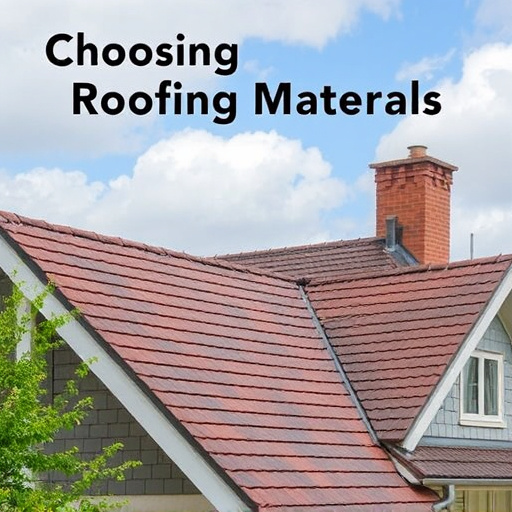
When considering choosing roofing materials, clay tiles stand out for their premium quality and durability. These traditional tiles have been a reliable option for centuries, offering excellent protection against harsh weather conditions. Clay tiles are known for their long lifespan, often exceeding 50 years with proper maintenance. Their robust design makes them resistant to high winds, heavy rain, and even some impact damage, making them a popular choice for both residential and commercial properties.
In terms of solar panel roofing integration, clay tiles can accommodate solar panels seamlessly, allowing homeowners to maximize space while still enjoying the benefits of renewable energy. Moreover, when faced with replace vs. repair roof damage, clay tiles often lean towards replacement due to their fragility. While repairs are possible, replacing the entire tile is usually more cost-effective and ensures a longer-lasting fix. Compared to other materials like asphalt shingles, clay tiles offer a more sophisticated aesthetic, increasing home value and providing a distinct look that complements various architectural styles.
Comparisons Between Common Materials
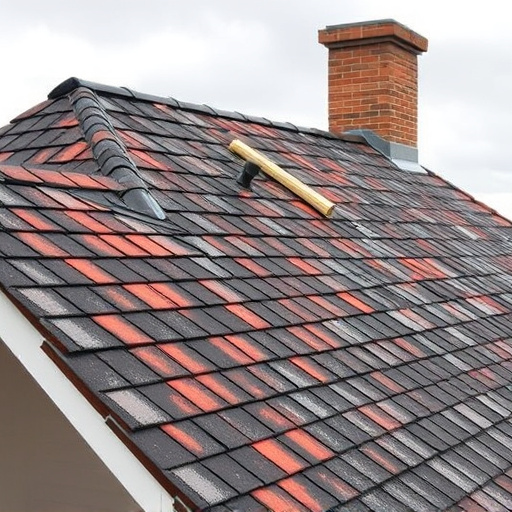
When considering roofing costs per square foot, one of the most significant factors is the choice of roofing materials. Each material has its unique slate roofing costs vs. benefits and characteristics, influencing both durability and price. For instance, traditional slate roofing offers exceptional longevity and aesthetic appeal but comes at a premium due to its natural origin and intricate installation process. Conversely, flat roof materials comparison between more modern options like TPO (Thermoplastic Olifine Polymer) or EPDM (Ethylene Propylene Diene Monomer) provides cost-effective solutions known for their durability and ease of installation.
Moreover, exploring modern metal roofing designs can offer both style and functionality. These materials are lightweight, highly durable, and increasingly designed to mimic traditional styles, making them a popular choice among homeowners seeking both beauty and energy efficient roofing solutions. Local roofing material recommendations often vary based on climate and architectural trends, so understanding the specific benefits and costs of each option is crucial when choosing roofing materials for any project.
Labor Costs: Significant Variable
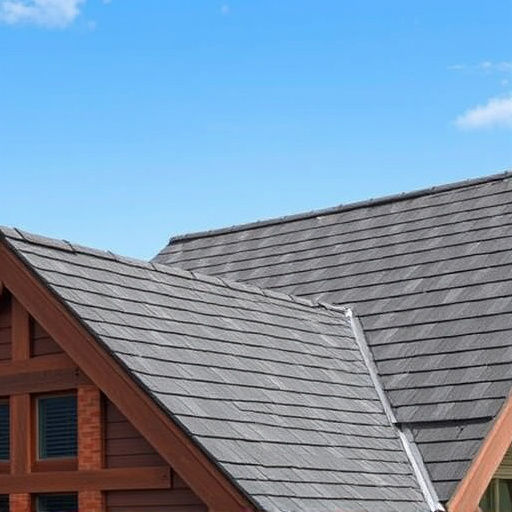
When it comes to roofing costs per square foot, labor expenses represent a significant variable that can greatly impact your overall budget. Unlike materials, which have a more straightforward cost structure, labor rates vary widely depending on factors like location, project complexity, and the type of roofers involved. This makes it crucial for homeowners to understand these fluctuations as they consider different roofing options. For instance, installing a traditional wood shake roof might require specialized skills due to its intricate design, leading to higher labor costs compared to a standard slate roofing job.
Choosing roofing materials is another critical aspect that influences labor expenses. While tiles or slates offer energy-efficient and aesthetically pleasing solutions, their installation can be more labor-intensive. Conversely, green roofing options or flat roofs might require less skilled labor but could still have hidden maintenance costs down the line. Remember, these factors contribute to the overall complexity of your project, so it’s essential to weigh them when planning your roofing endeavors, especially as you consider long-term sustainability and cost-effectiveness through tile roofing maintenance hacks or wood shake roofs: maintenance tips.
Regional Differences in Pricing
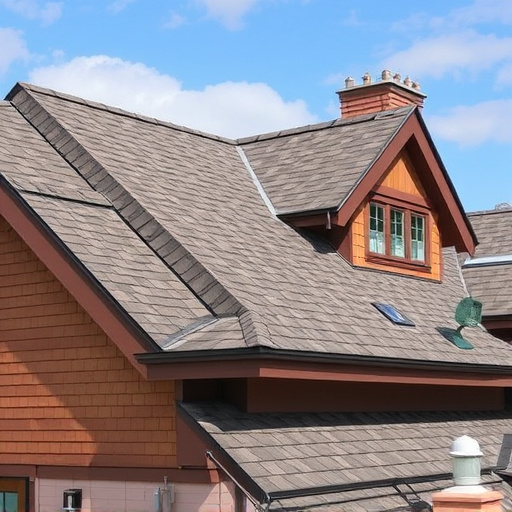
Roofing costs can vary significantly across different regions due to several factors. One of the primary influences is the availability and popularity of certain roofing materials in a specific area. For instance, areas with frequent rainfall might see higher prices for tile roofing, as it’s a durable option but also requires specialized installation and maintenance hacks. Conversely, regions with milder climates could have lower costs for wood shake roofs, though regular maintenance tips are essential for their longevity.
When choosing roofing materials, consider the local climate and environmental conditions. In areas prone to extreme weather events, such as hurricanes or snowstorms, reinforced materials may be necessary, increasing costs. On the other hand, regions with high energy costs might encourage the adoption of reflective roofing for heat reduction, which could offset some initial expenses over time. Ultimately, regional differences in pricing reflect local preferences and practical considerations when it comes to choosing roofing materials.
Home Size Impact on Roofing Costs
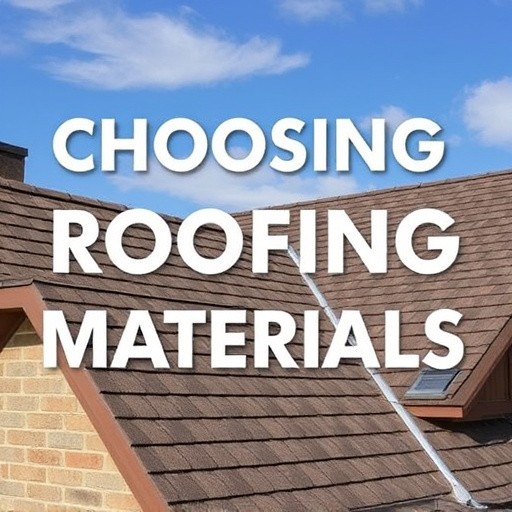
The size of a home is one of the primary factors influencing roofing costs. Larger structures typically require more materials and labor, leading to higher expenses per square foot compared to smaller homes. This is because roofing contractors need to cover a broader area with appropriate coverage, ensuring structural integrity. For instance, a standard asphalt shingle roof, a popular choice for residential properties, may cost around $2-$5 per square foot, while specialized flat roof materials comparison can range from $7-$15 or more, depending on the complexity and additional layers needed.
When choosing roofing materials, homeowners have various options, each with its own price point and benefits. Traditional red clay tile roofs, known for their aesthetic appeal and longevity, come with installation costs that can vary widely based on regional availability and labor rates. Conversely, metals roofings offer a wide array of styles and benefits, such as durability and low maintenance, but they generally command a higher price per square foot, ranging from $6-$12 or more, depending on the metal type and intricate design.
Maintenance and Longevity Considerations
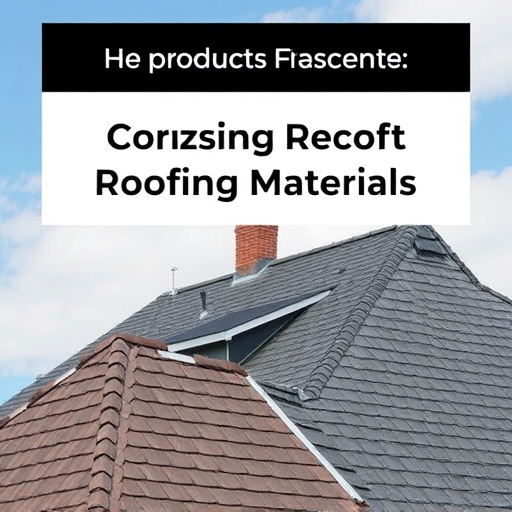
When considering average roofing costs per square foot, it’s crucial to remember that the initial expense isn’t the only factor to weigh. Maintenance and longevity play a significant role in determining the overall value of different roofing materials. Choosing roofing materials is more than just selecting a style; it involves an informed decision about your home’s protection from the elements over its lifespan.
Regular maintenance, such as cleaning gutters and replacing missing or damaged shingles, can extend the life of any roof. However, some materials require more attention than others. For instance, wood shake roofs, while aesthetically pleasing, demand diligent upkeep to prevent rot and insect infestation due to their organic nature. In contrast, a flat roof materials comparison reveals that options like metal roofing often come with longer warranties and lower maintenance needs, making them a best durable roofing option for savvy homeowners.
When considering roofing costs per square foot, understanding various factors is key. From material type (asphalt shingles, metal, wood shake, or clay tiles) to labor and regional pricing variations, each plays a significant role in the final price. Evaluating your budget alongside maintenance needs and longevity will help you make an informed decision when choosing roofing materials for your home. Remember, the right roof is not just about cost but also long-term value and protection.
